April 24, 1945: Soviet artillery fire makes the first direct hits on the Chancellery buildings and grounds directly above the Führerbunker.
April 24, 1945: Speer talks with Hitler for the last time in the Führerbunker. He supposedly confesses to his Führer that he has been countermanding his orders for scorched earth. However, the only account we have to support this contention is Speers own. There is some reason to believe that at least a portion of the story is no more than wishful thinking on Speer's part. However, the meeting certainly is contentious as Guderian will later relate that Hitler, after this meeting, declares: 'I refuse to see anyone alone anymore ....(Speer) always has something unpleasant to say to me. I can't bear that.' (Shirer, Sereny)
April 24, 1945: German General der Artillerie Helmuth Weidling, commander of the 56th Panzer Corps, arrives at the Fuehrerbunker. Communications with Weidling had been cut off since the 20th, and he had been sentenced to death on the 22nd as a deserter. He has traveled to Berlin to plead his innocence to his Fuehrer, who, impressed by the effort, soon gives him a new post. (Kershaw)
April 24, 1945: Albert Speer and Walter Frentz take their final leave of the Führerbunker.
April 24, 1945: Speer meets with Himmler, and fills him in on the events in Berlin and of Goering's fall. Himmler maintains that Goering's fall is temporary:
Goering is going to be the successor now. We've long had an understanding that I would be his Premier. Even without Hitler, I can make him Head-of-State .... You know what he's like—naturally, I'll be the one to make the decisions. I've already been in touch with various persons I mean to take into my Cabinet. Keitel is coming to see me shortly .... Europe cannot manage without me in the future, either. It will go on needing me as Minister of Police. After I've spent an hour with Eisenhower, he'll appreciate that fact. They'll soon realize that they're dependant on me—or they'll have a hopeless chaos on their hands.
After telling Speer of his recent negotiations with Swedish Red Cross envoy Bernadotte, Himmler hints that there may be a place for Speer in his cabinet. Speer will later write that he countered this by offering the Reichsführer SS the use of Speer's own private plane for the purpose of flying to Berlin to see Hitler one last time. Himmler declines: 'Now I must prepare my new government. And besides, my person is too important for the future of Germany for me to risk the flight.' (Speer, Read)

From Triumph and Tragedy, by Winston Churchill: In the early hours of April 25 a telegram arrived in London from Sir Victor Mallet, British Minister to Sweden. He reported that at 11 PM on April 24 he and his American colleague, Mr. Herschel Johnson, had been asked to call on the Swedish Minister for Foreign Affairs, Mr. Boheman. The purpose of the interview was to meet Count Bernadotte (above), who had an urgent mission. Bernadotte told him that Himmler was on the Eastern Front, and had asked to meet him urgently in Northern Germany. Bernadotte suggested Luebeck, and they had met the previous evening. Himmler, though tired and admitting Germany was finished, was still calm and coherent. He said that Hitler is so desperately ill that he might be dead already, and in any case would be so within the next few days. Himmler stated that while the Fuehrer was still active he would not have been able to do what he now proposed, but as Hitler was finished he could act with full authority.
He then asked if the Swedish Government would arrange for him to meet General Eisenhower and capitulate on the whole Western Front. Bernadotte said there was no need for this as he could simply order his troops to surrender, and in any case he would not forward the request unless Norway and Denmark were included in the capitulation. If this were done there might be some point to a meeting, because special arrangements might be necessary as to how and to whom the Germans there were to lay down their arms. Himmler thereupon said he was prepared to order the German forces in Denmark and Norway to surrender to either British, American, or Swedish troops. When asked what he proposed to do if the Western Allies refused his offer, Himmler replied that he would take command of the Eastern Front and die in battle. Himmler said he hoped that the Western Allies rather than the Russians would be the first to enter Mecklenberg, in order to save the civilian population. Count Bernadotte ended by saying that General Schellenberg was now in Flensburg, near the Danish border, eagerly waiting for news, and could make sure than any message would reach Himmler immediately.
Both Ministers remarked that Himmler's refusal to surrender on the Eastern Front looked like a last attempt to make trouble between the Western Allies and Russia. Obviously the Nazis would have to surrender to all the Allies simultaneously. The Swedish Minister admitted this might be so, but pointed out that if the troops on the whole of the Western Front and in Norway and Denmark laid down their arms it would be a great help for all the Allies, including Russia, and would lead to an early and total capitulation. In any case, he thought that Bernadotte's information should be passed to the British and American Governments. As far as his own government were concerned, we were completely at liberty to tell the Soviets, as the Swedes would in no way be, or thought to be, promoting discord between the Allies. The only reason that the Swedish Government could not inform the Soviets direct was that Himmler had stipulated that his information was exclusively for the Western Powers.
April 25, 1945 Churchill to Truman
:
You will no doubt have received some hours ago the report from Stockholm by your Ambassador on the Bernadotte-Himmler talks. I called the War Cabinet together at once, and they approved the immediately following telegram, which we are sending to Marshal Stalin and repeating through the usual channels to you. We hope you will find it possible to telegraph to Marshal Stalin and to us in the same sense. As Himmler is evidently speaking for the German State, as much as anybody can, the reply that should be sent him through the Swedish Government is in principle a matter for the triple Powers, since no one of us can enter into separate negotiations. This fact however in no way abrogates General Eisenhower's or Field-Marshal Alexander's authority to accept local surrenders as they occur. (Churchill)
April 25, 1945 Churchill to the British Cabinet
:
I spoke to President Truman (by telephone) at 8:10 PM. He knew nothing of what had happened at Stockholm, except that when I asked to speak to him he inquired what it was about, and I told him about the important message from Stockholm. He had not received any report from the American Ambassador there. I therefore read him the text of Mallet's telegram. I also told him we were convinced the surrender should be unconditional and simultaneous to the three major Powers. He expressed strong agreement with this ... (Churchill)
April 25, 1945 Churchill to Stalin
:
The President of the United States has the news also. There can be no question, as far as His Majesty's Government is concerned, of anything less than unconditional surrender simultaneously to the three major Powers. We consider Himmler should be told that German forces, either as individuals or in units, should everywhere surrender themselves to the Allied troops or representatives on the spot. Until this happens the attack of the Allies upon them on all sides and in all theaters where resistance continues will be prosecuted with the utmost vigor. (Churchill)
April 25, 1945 Stalin to Churchill
:
I consider your proposal to present to Himmler a demand for unconditional surrender on all fronts, including the Soviet front, the only correct one. Knowing you, I had no doubt that you would act in this way. I beg you to act in the sense of your proposal, and the Red Army will maintain its pressure on Berlin in the interests of our common cause. (Churchill)
April 25, 1945: German General der Artillerie Helmuth Weidling, who had earlier been sentenced to be executed by firing squad, is appointed commander of the Berlin Defense Area. Facing an advance by two and a half million battle-hardened Soviet soldiers, he has 44,600 German soldiers, 42,500 old and under-armed Volkssturm 'troops,' and 2,700 Hitler Youth with which to oppose them. (Kershaw)
April 25, 1945 Elbe Day
: US and Soviet forces link up at Torgau, Germany, on the Elbe River, a meeting that dramatizes the collapse of Nazi Germany's defenses. Arrangements are made for the formal 'Handshake of Torgau' between Robertson and Silvashko in front of photographers the following day. Statements are released simultaneously in London, Moscow, and Washington in the evening reaffirming the determination of the three Allied powers to complete the destruction of the Third Reich.
April 25, 1945: Hitler summons Heinz Linge - who serves as his valet, as well as the chief of his personal bodyguard - to give him a set of precise instructions. He gives him the task of carrying his body from the Bunker, after he has taken his own life, and cremating it. "No one must see or recognize me after death," he emphasizes. "After seeing to the burning, go back to my room and collect everything I could be remembered by after death. Take everything—uniforms, papers, everything I've used—anything that people could say belonged to the Fuehrer. Take it outside and burn it." He allows for only one of his personal possessions to survive him; his portrait of Frederick the Great by Anton Graff. Frederick is to be spirited out of Berlin by Hitler's personal pilot, Hans Baur. (Payne)
April 25, 1945: Soviet forces completely surround Berlin as the US Army blows the swastika from the top of the Zeppelintribuene. The last B-17 attack against Nazi Germany occurs. Nazi occupation army leaves Milan after a partisan insurrection; the liberation of Italy. Delegates from some 50 countries meet in San Francisco to organize the United Nations.
April 25, 1945 Goebbels Diary
:
Hitler said: 'I'd regard it as a thousand times more cowardly to commit suicide on the Obersalzberg than to stand and fall here. They shouldn't say: 'You, as the Führer ...' I'm only the Fuehrer as long as I can lead. And I can't lead through sitting somewhere on a mountain, but have to have authority over armies that obey. Let me win a victory here, however difficult and tough, then I've a right again to do away with the sluggish elements who are constantly causing an obstruction. Then I'll work with the generals who've proved themselves ... Only here can I attain a success, and even if it's only a moral one, it's at least the possibility of saving face and winning time. ... Only through a heroic attitude can we survive this hardest of times... It's the only chance to restore personal reputation ... if we leave the world stage in disgrace, we'll have lived for nothing. Whether you continue your life a bit longer or not is completely immaterial. Rather end the struggle with honor than continue in shame and dishonor a few months or years longer ... (Goebbels adds to his Führer's thoughts:) If all goes well, then it's in any case good. If things don't go well and the Führer finds in Berlin an honorable death and Europe were to become bolshevized, then in five years at the latest the Führer would be a legendary personality and National Socialism would have attained mythical status (ein Mythos) ... (Kershaw)
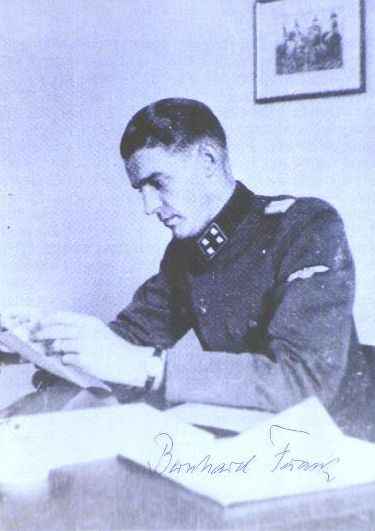
After his villa is bombed by the RAF, Goering convinces Bernhard Frank (above)—the leader of the SS squad holding him under house arrest—that it would be better if they all moved to Goering's castle in Mauterndorf. Early this morning, Goering, Lammers, Koller, and their SS guard leave for the castle. (Read)
April 26, 1945: As the party makes their way to Goering's castle in Mauterndorf, an announcement is made on German radio:
Reich Marshal Hermann Goering has been taken ill with his long-standing chronic heart condition, which has now entered an acute stage. At a time when the efforts of all forces are required, he has therefore requested to be relieved of his command of the Luftwaffe and all duties connected thereto. The Führer has granted this request. The Führer has appointed Colonel-General Ritter von Greim as the new Commander-in-Chief of the Luftwaffe while simultaneously promoting him to Field Marshal.
April 26, 1945: In the evening a small plane containing famed test pilot Hanna Reitsch and Luftwaffe General Ritter von Greim lands on an improvised air strip in the Tiergarten near the Brandenburg Gate following a daring flight in which Greim had been wounded in the foot by Soviet ground fire. Reitsch will later write that Hitler's 'head drooped heavily on his shoulders, and a continual twitching affected both his arms. His eyes glassy and remote, he greets us with an expressionless voice.'
The wounded Greim—who could just as well have been appointed by phone—is informed personally by Hitler that he is now a Field-Marshal and Goering's successor. Hitler tells them of Goering's 'treachery': 'Nothing is spared me! Nothing! Every disillusion, every betrayal, dishonor, treason has been heaped upon me. I have had Goering placed under immediate arrest, stripped him of all his offices, expelled him from every party organization ...' Hitler abruptly ends the meeting and leaves the room. Note: Payne places this meeting on the 24th, while Kershaw maintains that it occurred on the 26th. (Kershaw, Payne)
April 26, 1945 Churchill to Stalin
:
This is about 'Crossword.' The German envoys, with whom all contact was broken by us some days ago, have now arrived again on the Lake of Lucerne. They claim to have full powers to surrender the Army in Italy. Field-Marshal Alexander is therefore being told that he is free to permit these envoys to come to AFHQ in Italy. This they can easily do by going into France and being picked up by our aircraft from there. Will you please send Russian representatives forthwith to Field-Marshal Alexander's headquarters. Field-Marshal Alexander is free to accept the unconditional surrender of the considerable enemy army on his front, but all political issues are reserved to the three Governments. (Churchill)
April 26, 1945: Marshal Henri Philippe Petain, the head of France's Vichy government during WW2, is arrested on treason charges. The Germans evacuate the last survivors from Stutthof by sea to Luebeck. Hundreds die during the voyage.
April 27, 1945: OSS chief Allen Dulles is ordered by the US Joint Chiefs of Staff to resume negotiations with German 'peace' emissaries. Note: Waller says the 26th, Mosley the 27th. (Mosley, Waller)
April 27, 1945: An early morning situation conference in the Fuehrerbunker concentrates on Wenck's three battalion relief force just arriving at Potsdam. Giving up on hope that Busse's 9th Army can link up with Wenck, there still remains Holste's forces north-west of Berlin. Goebbels declares: "May God let Wenck come! A dreadful situation crosses my mind. Wenck is located at Potsdam, and here the Soviets are pressing on Potsdamer Platz!" Hitler replies: "And I'm not in Potsdam, but in Potsdamer Platz." One of the generals present voices reassurances: "Wenck will get here, Mein Führer! It's only a question of whether he can do it alone." Hitler opines: "You've got to imagine. That'll spread like wildfire through the whole of Berlin when it's known: a German army has broken through in the west and established contact with the Citadel (Festung)." (Kershaw)
April 27, 1945: A Führerbunker wedding celebration occurs as one of the drivers marries Liesl Ostertag, one of the kitchen maids. A reception is held in Hitler's apartment for the couple (who had earlier offered to smuggle the Goebbels children out of the Bunker, only to be refused by Magda). (Sereny, Sigmund)
April 27, 1945: The Voelkischer Beobachter, the newspaper of the Nazi Party, ceases publication.
April 27, 1945: Goebbels asks his Führer—while reminiscing about the good old days in the presence of a stenographer—why he had changed his mind in 1932 and decided to abandon his pursuit of the German Presidency for that of Chancellor:
Hitler: I was weaving my way from one compromise to another. This lasted until the death of Hindenburg. Previously, I thought I would expose ruthlessly people like (General) Hammerstein, Schleicher, and the whole clique around that dung heap. But after eighteen months this intention gradually became less firm. This was the time of the great work of construction. Otherwise, thousands would have been liquidated. Instead, we assimilated them.
Goebbels: It occurs to me that during March (1933), so many of these will-o-the-wisps entered the Party. There was a real frenzy for it. Because we were unwilling to take in these wretches, they asked us whether we had no desire for reconciliation. It would have been more correct if we had closed the Party and said: No more may enter.
Hitler: We could have done that if I had come to power as a result of a definite expression of the popular will or through a coup d'etat. Afterward, of course, one repents of being so goodhearted.
Goebbels: All the Austrian Gauleiters said at the time that there was a flaw in the revolution. It would have been much better if Vienna had resisted, and we could have shot the whole place to hell." Following similar self-serving comments—all lamenting the many disadvantages being 'Mr. Nice Guy' can bring to an honest fellow—Goebbels prompts his Führer further, asking him why he has chosen to remain in Berlin.
Hitler: I remain for the reason that I thereby have a greater moral right to act against weakness. Otherwise I do not have the moral right. I cannot continually threaten others if I myself run away from the capital of the Reich at the critical hour. We must introduce throughout the Wehrmacht a certain code of honor. A basic principle, always followed in the navy, must be taken over by the Party and be made binding on every member. In this city I have the right to give orders: now I must obey the commands of fate. Even if I could save myself, I would not. The captain goes down with his ship. (Payne)
April 27, 1945 Churchill to Stalin
:
I am extremely pleased to know that you had no doubt how I would act, and always will act, towards your glorious country and yourself. British and I am sure American action on this matter will go forward on the lines you approve, and we all three will continually keep each other fully informed. (Churchill)
April 28, 1945: Allied occupation forces set up a provisional occupation government in Austria as the first step towards re-establishing the Austrian republic. The bridge on the Potsdamerstrasse is seized.
April 28, 1945: The Allies reject peace offers made by Reichsfuehrer-SS Himmler, insisting on nothing less than unconditional surrender on all fronts. The International Red Cross, by arrangement with Himmler, begins the transport of 150 Jewish women from Ravensbrück to Sweden; the first of 3,500 Jewish and 3,500 non-Jewish women to be transferred to safety in the last ten days of the war.
April 28, 1945: Magda Goebbels (above, with family) pens a farewell letter to her 24 year old son from her first marriage, Harald Quandt (far right), a POW held in North Africa; the only one of her children who will survive her:
My beloved son! By now we have been in the Führerbunker for six days already—daddy, your six little siblings and I, for the sake of giving our national socialistic lives the only possible honorable end ... You shall know that I stayed here against daddy's will, and that even on last Sunday the Führer wanted to help me to get out. You know your mother—we have the same blood, for me there was no wavering. Our glorious idea is ruined and with it everything beautiful and marvelous that I have known in my life. The world that comes after the Fuehrer and national socialism is not any longer worth living in and therefore I took the children with me, for they are too good for the life that would follow, and a merciful God will understand me when I will give them the salvation ...
The children are wonderful ... there never is a word of complaint nor crying. The impacts are shaking the bunker. The elder kids cover the younger ones, their presence is a blessing and they are making the Fuehrer smile once in a while. May God help that I have the strength to perform the last and hardest. We only have one goal left: loyalty to the Führer even in death. Harald, my dear son—I want to give you what I learned in life: be loyal! Loyal to yourself, loyal to the people and loyal to your country ... Be proud of us and try to keep us in dear memory ...

On this Saturday night, the bodies of Benito Mussolini and his mistress Clara Petacci, are brought to Milan in a truck and dumped on the town square. The next day they will strung up by the heels from lampposts as Italian mobs celebrate by desecrating their corpses. Italian guerrillas had captured them while they were trying to escape to Switzerland and executed after a brief trial the previous day.
April 28, 1945: Doenitz, believing that Himmler will soon succeed Hitler, contacts the SS leader and assures him that he has his support. Doenitz asks the Reichsführer SS about rumors of Himmler's negotiations of surrender terms with the West. Himmler denies that there is anything to the rumors. (Shirer)
From Himmler, by Roger Manvell and Heinrich Fraenkel: While Schellenberg was during the morning of 28 April successfully calming Himmler with the aid of his favorite astrologer, the Allied press was pouring out the news of the Reichsführer's independent attempt at negotiations. Completely unaware of this, Himmler attended a military conference in Rheinsberg convened by Keitel. At this meeting Himmler presided, which showed that he regarded himself as Hitler's deputy and successor. In the late afternoon Bernadotte heard the news of the negotiations on the clandestine radio, and realized that Himmler was finished as a negotiator.
Doenitz also heard the report and telephoned inquiries to Himmler, who immediately denied the story as it had been put in the broadcast, but added that he had no intention of issuing any public statement himself. According to Schellenberg, he then spent part of the day deciding how best to order the evacuation of German troops from Norway and Denmark. It was not until nine o'clock that night that a monitor report on a broadcast put out by the BBC gave Himmler away to the Führer in the bowels of the Bunker. According to one observer, Hitler's 'color rose to a heated red, and his face became virtually unrecognizable.' Then he began to rage at this treacherous betrayal by the man he had trusted most of all. The men and women hemmed in the Bunker were convulsed with emotion, and 'everyone looked to their poison.'

Sometime between 7 and 9 PM, a BBC report picked up in the Führerbunker announces that Himmler has just offered to surrender Germany unconditionally to the Allies. Rochus Misch (above), the switchboard officer on duty in the Führerbunker, will later tell Gitta Sereny:
He (Hitler) was sitting on that bench outside my switchboard room with a puppy in his lap when Lorenz, whom I heard arrive at a run, handed him the paper on which he had jotted down the radio dispatch. Hitler's face went completely white, almost ashen. 'My God,' I thought, 'he is going to faint.' He slumped forward holding his head with his hands. The puppy plumped to the ground—silly how one remembers such trifles, but I can still here that soft sound.
Enraged at Himmler's duplicity, Hitler rants uncontrollably about this new betrayal, then closets himself in a conference room with Bormann and Goebbels. He first orders that Otto Hermann Fegelein, Himmler's man at the Bunker, be arrested. He then orders Field Marshal von Greim and Hanna Reitsch to fly to Doenitz's headquarters at Ploen and arrest Himmler. 'A traitor must never succeed me as Fuehrer,' he screams. 'You must get out (of Berlin) to make sure he doesn't.' (Read, Sereny)
April 28, 1945: SS-Obergruppenführer Hans Georg Otto Hermann Fegelein—the brother-in-law of Eva Braun and also Himmler's liaison officer in the bunker—is arrested in civilian clothes while preparing to leave the country. He is brought back to Hitler's bunker, but is temporarily saved by Eva's pleas for mercy on behalf of her pregnant sister. The reprieve proves short-lived as Hitler soon becomes convinced that Fegelein's escape attempt is part of Himmler's treachery. Within an hour Fegelein is tried, sentenced to death, taken up to the Reich Chancellery Garden, and executed with a bullet in the back of his head. (Read)
April 28, 1945: Robert Ritter von Greim, and Hanna Reitsch take their final leave of the Führerbunker.
April 28, 1945: Martin Bormann wires Admiral Doenitz:
"Reich Chancellery (Reichskanzlei) a heap of rubble." He informs Keitel that the foreign press is reporting fresh acts of treason and 'that without exception Schoerner, Wenck and the others must give evidence of their loyalty by the quickest relief of the Führer.
April 29, 1945: Around 2:00 AM, Hitler sends for a sleeping Traudl Junge, one of his personal secretaries, who will later tell Gitta Sereny:
I quickly washed my face and went down to his study. A table in the corner had been laid as if for a party—glasses, small plates, cutlery—but I didn't know for what occasion. He was very quiet when I came in, but courteous as ever. He took my hand. Was I all right? he asked. Had I had a rest? I said I had, and he took me to the large conference room and told me to make myself comfortable, what he had to dictate would take some time, and would have to be transcribed as quickly as possible afterwards. Couriers would be waiting to take it out. (Sereny)
April 29, 1945: Hitler dictates his last Political Testament to Traudl Junge:
I left no doubt about the fact that if the peoples of Europe were again only regarded as so many packages of stock shares by these international money and finance conspirators, then that race, too, which is the truly guilty party in this murderous struggle would also have to be held to account: the Jews! I further left no doubt that this time we would not permit millions of European children of Aryan descent to die of hunger, nor millions of grown-up men to suffer death, nor hundreds of thousands of women and children to be burned and bombed to death in their cities, without truly guilty party having to atone for its guilt, even if through
more humane means... Hitler continues dictating as Traudl Junge takes down his Last Will and personal Testament:
As I did not consider that I could take responsibility, during the years of struggle, of contracting a marriage, I have now decided, before the closing of my earthly career, to take as my wife that girl who, after many years of faithful friendship, entered, of her own free will, the practically besieged town in order to share her destiny with me. At her own desire she goes as my wife with me into death. It will compensate us for what we both lost through my work in the service of my people. What I possess belongs—in so far as it has any value—to the Party. Should this no longer exist, to the State; should the State also be destroyed, no further decision of mine is necessary. My pictures, in the collections which I have bought in the course of years, have never been collected for private purposes, but only for the extension of a gallery in my home town of Linz on Donau. It is my most sincere wish that this bequest may be duly executed. I nominate as my Executor my most faithful Party comrade, Martin Bormann. He is given full legal authority to make all decisions. He is permitted to take out everything that has a sentimental value or is necessary for the maintenance of a modest simple life, for my brothers and sisters, also above all for the mother of my wife and my faithful co-workers who are well known to him, principally my old Secretaries Frau Winter etc. who have for many years aided me by their work. I myself and my wife—in order to escape the disgrace of deposition or capitulation—choose death. It is our wish to be burnt immediately on the spot where I have carried out the greatest part of my daily work in the course of a twelve years' service to my people.
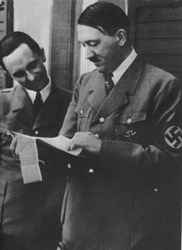
Traudl Junge begins to type up Hitler's official will and testament. Junge will later tell Gitta Sereny:
You know, here we were, all of us doomed, I thought—the whole country doomed—and here, in what he was dictating to me there was not one word of compassion or regret, only awful, awful, anger. I remember thinking, 'My God, he hasn't learned anything. It's all just the same' ... It was only when he dictated his private will, in which he explained his decision to marry, that I found out ... It didn't take me long (to type up). There were ten pages of the Political Testament and just three for the private one. It would have gone even faster if Goebbels hadn't come in the middle.
Reich Propaganda Minister Joseph Goebbels appears in her office, weeping like a small child. Hitler has ordered him to leave Berlin, he wails.
But I don't want to run away and leave the Führer. I am the Gauleiter of Berlin and my place is here. If the Führer dies, my life has no meaning. He even said to me, 'Goebbels, I didn't expect this from you! You refuse to obey my last orders!' (Sereny, Read)
April 29, 1945: The distraught Goebbels then dictates his own political testament, as an appendix to Hitler's.
The Führer had ordered me to leave Berlin ... and take part as a leading member in the government appointed by him. For the first time in my life, I must categorically refuse to obey an order of the Fuehrer. My wife and children join me in this refusal. Apart from the fact that feelings of humanity and personal loyalty forbid us to abandon the Führer in his hour of greatest need, I would otherwise appear for the rest of my life as a dishonorable traitor and a common scoundrel and would lose my self-respect as well as the respect of my fellow citizens ... In the nightmare of treason which surrounds the Führer in these most critical days of the war, there must be someone at least who will stay with him unconditionally until death ... I believe I am thereby doing the best service to the future of the German people. In the hard times to come, examples will be more important than men .... For this reason, together with my wife, and on behalf of my children, who are too young to be able to speak for themselves and who, if they were old enough, would unreservedly agree with this decision, I express my unalterable resolution not to leave the Reich capital, even if it falls, but rather, at the side of the Führer, to end a life that for me personally will have no further value if I cannot spend it at the service of the Führer and at his side.
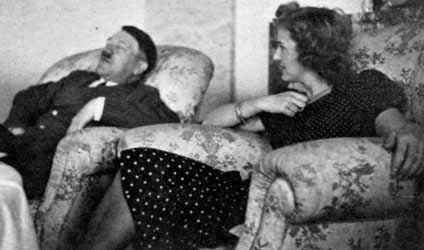
Hitler and Eva Braun exchange marriage vows. A minor official named Walter Wagner—pulled from his Volkssturm unit on the front lines—conducts the ceremony. Goebbels is witness for Hitler and Bormann for Eva. Only eight guests are allowed to attend: Bormann, Joseph and Magda Goebbels, Gerda Christian, Chief Adjutant Bergdorf, General Krebs, Arthur Axmann, head of the Hitler Youth, and Fraulein Manzialy, Hitler's cook. The rest of the staff wait outside to congratulate the newly wedded couple as the phonograph is wound up and the one record remaining in the Bunker, 'Red Roses,' is set to spinning. Junge will later tell Gitta Sereny:
I joined the party in the study (after typing the last testaments). I sat down with them around the table and ate little sandwiches and drank champagne as they apparently had been doing for quite awhile. Nobody said anything. We couldn't very well toast their future.
Walter Wagner fades back into obscurity. Note: One wonders if Wagner was given a last glass of bubbly before being sent back to the front. (Shirer, Payne, Sereny)
April 29, 1945: At 4 AM, Hitler officially signs the last will and political testament documents prepared by Traudl Junge. Signed as witnesses: Dr. Joseph Goebbels, Martin Bormann, Colonel Nicholaus von Below. Below will write later:
They called me to the map room at 4 AM ... I was surprised when Hitler asked me to witness his private will, together with Goebbels and Bormann. But I also read the Political Testament and found his self-description really depressing and his repeated anti-Semitic invectives embarrassing ...
April 29, 1945 Churchill to Stalin
:
I have just received a telegram from Field-Marshal Alexander that after a meeting at which your officers were present the Germans accepted the terms of unconditional surrender presented to them and are sending the material clauses of the instrument of surrender to General von Vietinghoff, with the request to name the date and hour at which conclusion of hostilities can be made effective. It looks therefore as if the entire German forces south of the Alps will almost immediately surrender. (Churchill)
April 29, 1945 Churchill to Stalin
:
We are all shocked that you should think we would favor a Polish Government hostile to the Soviet Union. This is the opposite of our policy. But it was on account of Poland that the British went to war with Germany in 1939. We saw in the Nazi treatment of Poland a symbol of Hitler's vile and wicked lust of conquest and subjugation, and his invasion of Poland was the spark that fired the mine. The British people do not, as is sometimes thought, go to war for calculation, but for sentiment. They had a feeling which grew up in years that with all Hitler's encroachments and doctrine he was a danger to our country and to the liberties which we prize in Europe, and when after Munich he broke his word so shamefully about Czechoslovakia even the extremely peace-loving Chamberlain gave our guarantee against Hitler to Poland.
When that guarantee was invoked by the German invasion of Poland the whole nation went to war with Hitler, unprepared as we were. There was a flame in the hearts of men like that which swept your people in the noble defense of their country from a treacherous, brutal, and at one time it almost seemed, overwhelming German attack. This British flame burns still among all classes and parties in this Island, and in its self-governing Dominions, and they can never feel this war will have ended rightly unless Poland has a fair deal in the full sense of sovereignty, independence, and freedom, on the basis of friendship with Russia. It was on this that I thought we had agreed at Yalta. There is not much comfort in looking into a future where you and the countries you dominate, plus the Communist Parties in many other States, are all drawn up on one side, and those who rally to the English-speaking nations and their associates, or Dominions on the other. It is quite obvious that their quarrel would tear the world to pieces and that all of us leading men on either side who had anything to do with that would be shamed before history. (Churchill)
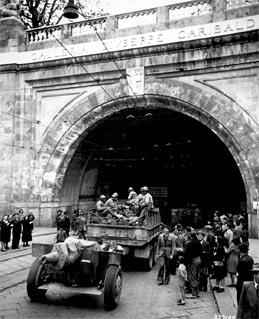
An unconditional surrender of the German armies in Italy is signed at Caserta; Venice and Mestre are captured by the Allies.
April 29, 1945: Dachau is liberated by the US 45th Infantry Division. Some 20-30 SS men are said to have been captured. Eyewitnesses will later relate that 34 of the 200 guards captured are murdered by the Americans after surrendering. The camp inmates tear apart 15-20 informers and kill all the Capos, who are described for the most part as common German criminals. (Waller)
April 29, 1945: At noon, three copies of Hitler's the last will and political testament documents are sent by courier to Doenitz, General Schoerner, and the Brown House in Munich, respectively. (Payne)
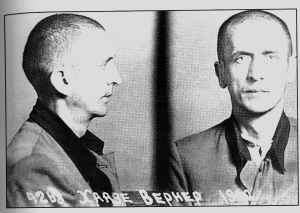
From Hitler: Nemesis 1936-1945 by Ian Kershaw: The mood in the bunker now sank to zero-level. Despair was now written on everyone's face. All knew it was only a matter of hours before Hitler killed himself, and wondered what the future held for them after his death. There was much talk of the best methods of committing suicide. Secretaries, adjutants, and any others who wanted them had by now been given the brass-cased ampoules containing prussic acid supplied by Dr. Ludwig Stumpfegger, the SS surgeon who had joined the 'court' the previous October. Hitler's paranoia stretched now to doubts about the capsules. He had shown his Alsatian bitch Blondi more affection in recent years than any human being, probably including even Eva Braun. Now, as the end approached, he had the poison tested on Blondi. Professor Werner Haase (above) was summoned from his duties in the nearby public air-raid shelter beneath the new Reich Chancellery building nearby. Shortly before the afternoon briefing on 29 April, aided by Hitler's dog attendant, Sergeant Fritz Tornow, he forced open the dogs jaws and crushed the prussic acid capsule with a pair of pliers. The dog slumped in an instant motionless to the ground. Hitler was not present. However, he entered the room immediately afterwards. He glanced for a few seconds at the dead dog. Then, his face like a mask, he left without saying anything and shut himself in his room.
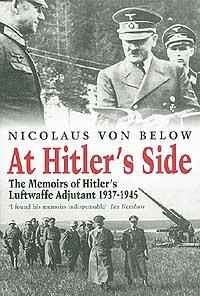
At the afternoon situation conference, General Burgdorf requests that Hitler's Air Force adjutant, Colonel Nicolaus von Below, be allowed to leave the Bunker. Hitler acquiesces, and requests that von Below perform one last service to his Führer; deliver a message to Keitel. After the conference, he dictates what has been called the last message Hitler will send from the Bunker:
The people and the Armed Forces have given their all in this long and hard struggle. The sacrifice has been enormous. But my trust has been misused by many people. Disloyalty and betrayal have undermined resistance throughout the war. It was therefore not granted to me to lead the people to victory. The Army General Staff cannot be compared with the General Staff in the First World War. Its achievements were far behind those of the fighting front. The efforts and sacrifices of the German people in this war have been so great that I cannot believe they have been in vain. The aim must still be to win territory in the West for the German people.
Note: The message will never be delivered as von Below will destroy it while wandering around behind enemy lines two days later. The version above—quoted from Payne—is recreated from von Below's memory, with no other corroborating documentation. (Payne, Kershaw)
April 29, 1945: Hitler shares his fears of being overcome with gas and captured by the Soviets with his pilot, Hans Baur:
The Russians know perfectly well that I am here in this bunker. I'm afraid they will use gas shells. During the war we produced a gas that could put a man to sleep for twenty-four hours. Our intelligence tells me that the Russians now have this gas too. The consequences would be unimaginable if they captured me alive. (Payne)
April 29, 1945: At 6 PM, Hitler announces to his staff that he and his wife, Eva, are going to commit suicide together unless some miracle intervenes. He then passes out vials of cyanide. At 9 PM, the news of the murder and the public humiliation of Mussolini and his mistress reaches the Bunker. Hitler vows that he will not share a similar fate.
April 29, 1945: Heinrich Mueller, Bernd von Freytag-Loringhoven, Gerhardt Boldt, and Rudolf Weiss take their final leave of the Führerbunker.
April 29, 1945: Hjalmar Schacht, who had been implicated in the July 20 Plot to assassinate Hitler and arrested by the Gestapo, is now arrested by the US 9th Army. Note: Schacht will be acquitted at the first Nuremberg Trial.
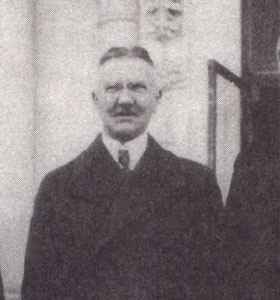
From The Nuremberg Trial, by Joe J. Heydecker and Johannes Leeb: Ravensbrück, Moabit, and finally the extermination camp of Flossenburg were his (Schacht's) stopping places. 'No one gets out alive from this camp,' Schacht whispered to his fellow prisoners when he was brought in. Through the open door of a shed in the camp, there was a view of the scaffolding of the gallows. Every night Schacht heard the screams and shots which left no doubt what was happening. Many a morning, as he took his exercise, he could count up to thirty dead being carried away on stretchers from the places of execution.
Only much later Schacht learned that the commandant of Flossenburg had been expressly ordered to shoot him as soon as the Allies came anywhere near the camp. But it did not come to that. In the face of imminent defeat the SS suddenly attempted to introduce a more humane treatment, perhaps in the hope of thereby saving themselves.
Thus Schacht, together with other prisoners, was transferred first to Dachau and later to Austria when the Americans advanced. As the transport halted at the Pragser Wildsee the Ninth Army liberated him, and with him a number of others who were internees and 'VIP prisoners' of Hitler ...(among them: Pastor Martin Niemoeller, Miklos Kallay, Bruno Bettelheim, Kurt von Schuschnigg, Fritz Thyssen, Leon Blum, Nicholas von Horthy, Alext Kokosin, Franz Halder, Peter Churchill) ..."Why did Hitler put you in jail? Schacht was asked by the Americans. 'No idea,' answered the banker.
He also had no idea why he was not set free, but kept under arrest. He was well treated, he had excellent food, and was allowed to walk unguarded by the Pragser lake. But then he was moved again, and by various stages reached eventually the overcrowded prisoner-of-war camp Aversa near Naples. Hjalmar Schacht, the financial genius with the old-fashioned stand-up collar, had changed sides several times. Now he was on his way to the prison at Nuremberg.
April 29, 1945: Late in the evening, General Krebs radios General Jodl with three terse questions from Hitler:
Request immediate report. Firstly of the whereabouts of Wenck's spearheads. Secondly of time intended to attack. Thirdly of the location of the Ninth Army. Fourthly of the precise place in which the Ninth Army will break through. Fifthly of the whereabouts of General Rudolf Holste's spearhead. (Kershaw)
April 30, 1945: Jodl replies to Krebs:
Firstly, Wenck's spearhead bogged down south of Schwielow Lake. Secondly, Twelfth Army therefore unable to continue attack on Berlin. Thirdly, bulk of Ninth Army surrounded. Fourthly, Holste's Corps on the defensive." Keitel writes on the bottom: "Attacks on Berlin not advanced anywhere. (Kershaw)
April 30, 1945: Nicolaus von Below takes his final leave of the Fuehrerbunker, carrying Hitler's 'last message' to Keitel. (Payne)
April 30, 1945 Churchill to Truman
:
There can be little doubt that the liberation of Prague and as much as possible of the territory of Western Czechoslovakia by your forces might make the whole difference to the post-war situation in Czechoslovakia, and might well influence that in near-by countries. On the other hand, if the Western Allies play no significant part in Czechoslovakian liberation that country will go the way of Yugoslavia. Of course, such a move by Eisenhower must not interfere with his main operations against the Germans, but I think the highly-important political consideration mentioned above should be brought to his attention. (Churchill)
April 30, 1945: In the early morning hours, Bormann dispatches a message to Doenitz:
DOENITZ! Our impression grows daily stronger that the divisions in the Berlin theater have been standing idle for several days. All reports we receive are controlled, suppressed, or distorted by Keitel .... The Führer orders you to proceed at once, and mercilessly, against all traitors .... The Führer is alive, and is conducting the defense of Berlin ... (Shirer)
April 30, 1945: By late morning, the Soviets have overrun the Tiergarten in Berlin, and one advance unit is reported on one of the streets next to Hitler's bunker under the Reich Chancellery. SS Brigadeführer Wilhelm Mohnke, commander of the center sector of Berlin, informs Hitler that the center will be able to hold out for less than two days. Later that morning Weidling informs Hitler in person that the defenders will likely exhaust their ammunition that night and again asks Hitler's permission to break out. At about 13:00 Weidling finally receives Hitler's permission to attempt a breakout in the evening.
April 30, 1945: Hitler sends for Bormann at noon and informs him that the end is near. He then attends one last lunch with his secretaries and his cook, who prepares spaghetti with a light sauce. Eva is not present, but she joins him after the lunch to shake hands and say sad farewells to the staff. Eva embraces Traudl Junge: 'Please try to get out of here,' she pleads. 'You might make it. Give my love to Bavaria.' Hitler and Eva then enter Hitler's private quarters and close the door behind them. SS-Sturmbannführer Otto Guensche takes up his post at the door, with orders that the couple not be disturbed. (Read, Payne)
April 30, 1945: Soviet forces enter Ravensbrück concentration camp north of Berlin. Meanwhile, Allied troops capture Munich and French forces cross the border into Austria. At 3:00 PM, American forces in Nuremberg discover the tunnel and underground bunker where the spear of Longinus (the Holy Lance) has been hidden to prevent its capture by the Allies.
April 30, 1945: After the Hitlers retire to their room, Traudl Junge suddenly realizes that, in the excitement, no one had thought to feed the Goebbels' children. She rounds them up, leads them to the tiny dining room, and scrounges up some fruit and sandwich ingredients. Junge will later relate that she 'heard the shot' while making sandwiches and for them. Rochus Misch will later tell Oliver Harvey:
I saw Hitler slumped by the table. I did not see any blood on his head. And I saw Eva with her knees drawn up, lying next to him on the sofa. Hitler was wrapped in a blanket as I watched. He was then taken outside to be burnt. It was over.
Note: There is some dispute in the historical record concerning some of the events of this day. One is the contention that a distraught Magda Goebbels had actually burst in on Hitler and Eva in the privacy of their room, making one last tearful plea to Hitler that he allow himself and the rest of them to escape Berlin and make a last stand at Obersalzberg. However, other eyewitnesses have denied that any such scene actually occurred, and it is quite doubtful that it ever did. Another area of dispute is whether or not the shot that killed Hitler was actually heard by any of the Bunker witnesses. Some say they heard the shot, but others will testify that they did not, and that the door was too soundproof to have allowed the sound to escape. Definitive answers are difficult when eyewitnesses disagree. (Read)
From Women of the Third Reich, by Anna Maria Sigmund: On April 30, 1945, when Hitler and Eva Braun, now married, took their leave in order to commit suicide, Magda Goebbels cried out in shock, 'My Führer, do not leave us; we will perish miserably without you!' Traudl Junge, Hitler's secretary, was just giving food to the Goebbels children when she heard a shot coming from Hitler's den. With regard to Magda Goebbels' intentions, there are conflicting reports. Albert Speer believed that, '... she found the idea that her children had to die unbearable, but she submitted, it seemed, to her husband's decision.' Two close co-workers of the propaganda minister, however, claimed they had overheard Goebbels suggest to his wife that she flee to the West since they had nothing to fear from the British.
April 30, 1945 Death
: At 3:30 PM, Adolf Hitler and his new wife, Eva Braun, commit suicide in their private quarters under the Chancellery. Their bodies are taken above ground by Hitler's aides, burned with difficulty due to the conditions and the limited supply of gasoline, and buried in a shallow grave formed from a bomb crater. Kempka, Goebbels, Bormann, Krebs, Linge, and Burgdorf give one last Nazi salute to their Führer, before an exploding Soviet shell sends them scurrying back down into the Bunker. (Read)

From Napoleon and Hitler: A Comparative Biography, by Desmond Seward: During the Emperor's flight from Russia in 1812 he speculated as to what the Allies would do if they caught him. 'Can you picture to yourself, Caulaincourt, the figure you would cut in an iron cage, in the main square of London?' He then had a fit of hysteria. Hitler had no illusions. He knew that he would be put on show and then executed...in the one chivalrous gesture of his entire life, he married Eva Braun. Next day both retired to their bedroom to die. Clutching a photograph of his mother, the Fuehrer shot himself, while Eva took poison. Amid his own ruin in 1814 Napoleon confided in a loyal supporter 'My dear fellow, if the Cossacks reach the gates of Paris it's the end of Emperor and Empire.' As it was, Tsar Alexander's Cossacks stabled their horses in Paris. In 1945 Stalin's Cossacks rode into Berlin. Neither capital need have entertained them had it not been for their rulers' madness. Determined to escape from a war on two fronts, both had been destroyed by such a war.
April 30, 1945: Goebbels presides at his first and last situation conference as Reich Chancellor. Bormann proposes that the 300 to 500 troops around the Bunker spearhead a breakout through the Soviet lines to link up with Doenitz, but Goebbels rules it out. He decides instead to send General Krebs to the Soviet lines under a white flag with a truce proposal. (Read)
April 30, 1945: Bormann and Goebbels again radio Doenitz, without informing him that Hitler is already dead:
The Führer has appointed you, Herr Admiral, as his successor in place of Reichsmarschall Goering. Confirmation in writing follows. You are hereby authorized to take any measures which the situation demands. (Shirer)
April 30, 1945: The bizzare turn of events catching him completely off guard, Doenitz, in shock, has absolutely no desire to succeed Hitler. Believing that Hitler is still alive, he replies to the previous message from the Führerbunker with as much encouragement as he can muster:
MY FUEHRER! My loyalty to you will be unconditional. I shall do everything possible to relieve you in Berlin. If fate nevertheless compels me to rule the Reich as your appointed successor, I shall continue this war to an end worthy of the unique, heroic struggle of the German people. (Shirer)
April 30, 1945: The Red Army captures the Reichstag at 10:50 PM, hoisting the first of more than forty victory flags, though no photograph can be taken due to the late hour. Various Soviet military units will unfurl and photograph an assortment of flags, of which the one above is the 'official' victory flag, photographed early on the morning of May 1. German artillery will knock it down later that same morning, and it will be replaced in the afternoon only to be taken down on May 3 and eventually shipped to Moscow.
May 1, 1945: An announcement is made on the German wireless: Announcer:
It has been reported from the Führer's headquarters that our Führer Adolf Hitler has died this afternoon in his battle headquarters at the Reich Chancellery, fallen for Germany, fighting to the last breath against Bolshevism. On the 30th of April the Fuehrer nominated Grossadmiral Doenitz to be his successor. The Grossadmiral and Führer's successor will speak to the German nation." Doenitz: "German men and women, soldiers of the German Armed Forces. Our Führer Adolf Hitler is dead. The German people bow in deepest sorrow and respect. Early he had recognized the terrible danger of Bolshevism and had dedicated his life to the fight against it. His fight having ended, he died a hero's death in the capital of the German Reich, after having led an unmistakably straight and steady life.
From Adolf Hitler and the German Trauma, by Robert Edwin Herzstein: Bormann made sure that the news of Hitler's death was not broadcast until he had made one last desperate attempt to achieve supreme power for himself. First he attempted to manipulate and control Admiral Doenitz, who was still at liberty in northern Germany. Bormann informed Doenitz that he would soon join him in Flensburg. This never occurred ...
When Hitler's death was announced, it was done in the true spirit of National Socialism; false heroism and blatant lies. The slow movement of Bruckner's Eighth Symphony was played, along with Siegfried's 'Funeral Music' by Wagner. Then it was announced that 'Adolf Hitler has fallen at his command post in Berlin after fighting with his last breath against the Bolsheviks.' This was consistent with Nazi rhetoric, for in April Nazi and SS officials had scrawled all over the walls of beleaguered Berlin: 'Berlin remains German.' 'Our walls are broken but not our hearts,' 'SS believes in the Führer.' If Hitler had indeed committed suicide and had not fought the Russians to the very end, it might appear as if he had irresponsibly and pusillanimously tricked and betrayed the millions who had taken an oath of allegiance to him in one form or another.
May 1, 1945: Martin Bormann's fifteen year old son and namesake had been enrolled in the Nazi-elite school, Feldafing, but the school had closed its doors April 23. He was provided with 100 RM, false identification papers (under the name of Martin Bergmann), and transportation to a hideout near Salzburg. Martin the Younger will later tell Gitta Sereny:
It was a small inn and a very small Stube. We sat on benches tightly packed together. It's impossible now to convey the atmosphere. The worst moment was when, at two o'clock in the morning on May 1, the news of Hitler's death came through on the radio. I remember it precisely, but I can't describe the stillness of that instant which lasted...for hours. Nobody said anything, but very soon afterwards people started to go outside, first one—then there was a shot. Then another, and yet another. Not a word inside, no other sound except those shots from outside, but one felt that that was all there was, that all of us would have to die. (Picking up a gun, Martin walks outside.) My world was shattered; I couldn't see any future at all. But then, out there, in the back of that Inn, where bodies were already lying all over the small garden, there was another boy, older that I—he was eighteen. He was sitting on a log and told me to come sit with him. The air smelled good, the birds sang, and we talked ourselves out of it. If we hadn't had each other at that moment, both of us would have gone—I know it. (Note: He will live to become a jesuit father.) (Sereny)
May 1, 1945: General Krebs meets with Zhukov, but returns empty handed after refusing to agree to an unconditional surrender. Note: Only Reichskanzler Goebbels now has the authority to agree to an unconditional surrender.
May 1, 1945: Magda Goebbels combs out the hair of each of her six children (ages 5 to 13) and dresses them for bed. Rochus Misch will later tell Gitta Sereny:
It was only just after 5 PM when Frau Goebbels walked past me followed by the children. They were all wearing white nightgowns. She took them next door. An orderly arrived carrying a tray with six cups and a jug of chocolate. Later somebody said it was laced with sleeping pills. I saw her hug some, stroke others as they drank it. I don't think they knew about their Uncle Adolf's death; they laughed and chatted as always. A little later they passed me on their way upstairs, Heidi last, her mother holding her hand. Heidi turned around. I waved to her, she waved back with one hand, and the suddenly, letting go of her mother's hand, she turned all the way around and, bursting into that happy clear laugh of hers, she scraped one forefinger along the other and chanted that little rhyme she always sang when she saw me: 'Misch, Misch, you are a fish.' (Misch, Misch, Du bist ein Fisch.) Her mother put her arm around her and pulled her gently up the steps, but she went on chanting it. I still hear it now.
After the children have fallen asleep, Magda—her husband is not present and does not participate—assists Hitler's personal physician, Dr. Ludwig Stumpfegger, as he administers lethal injections to all six of the children. After ensuring their demise—and apparently struggling with her oldest daughter who, it seems, had not been slumbering sufficiently to sleep through the pain of the fatal injection—Magda leaves the room and sits down to play solitaire. (Sereny)
May 1, 1945:
Albert Speer hears of Hitler's death. Annemarie Kemp will later tell Gitta Sereny
:
I think it was raining on May 1. Anyway, we were inside our living room trailer when the phone rang. It was Doenitz. One of us took the call—I don't remember if it was me or Edith; he didn't ask to speak to anyone in particular. As I remember he just said, 'The Führer is no longer alive,' and then hung up. I remember I felt, well, taken aback, because of course, I hadn't known. Were we sad? Oh, I don't know. We were no longer in a state of mind where the word 'sad' could apply. Germany was in tatters. There was no future, and now he was dead too. Speer left a few minutes later to join Doenitz at Ploen. (Sereny)
May 1, 1945: Doenitz receives another radio message signed by Goebbels and Bormann:
The Führer died yesterday, 1530 hours. In his will dated April 29 he appoints you as President of the Reich, Goebbels as Reich Chancellor, Bormann as Party Minister, Seyss-Inquart as Foreign Minister. The will, by order of the Führer, is being sent to you and to Field Marshal Schoerner and out of Berlin for safe custody. Bormann will try to reach you today to explain the situation. Form and timing of announcement to the Armed Forces and the public is left to your discretion. Acknowledge.
From Doenitz's testimony before the IMT: This radio message first of all contradicted the earlier radio message which clearly stated: "You can at once do everything you consider to be right." I did not and as a matter of principle never would adhere to this second radio message, for if I am to take responsibility, then no conditions must be imposed on me. Thirdly, under no circumstances would I have agreed to working with the people mentioned, with the exception of Seyss-Inquart. In the early morning of 1 May I had already had a discussion with the Minister of Finance, Count Schwerin von Krosigk, and had asked him to take over the business of government, insofar as we could still talk about that.
I had done this because in a chance discussion, which had taken place several days before, I had seen that we held much the same view, the view that the German people belonged to the Christian West, that the basis of future conditions of life is the absolute legal security of the individual and of private property. ...the legitimate successor would have been the Reich Marshal; but through a regrettable misunderstanding a few days before his appointment, he was no longer in the game, and I was the next senior officer in command of an independent branch of the Wehrmacht. I believe that was the determining factor. That fact that the Fuehrer had confidence in me may also have had something to do with it.

Joseph and Magda Goebbels commit suicide mere feet away from the partially burned and buried body of their Führer.
From The Devil's Disciples, by Anthony Read: At 8:15 PM Goebbels informed the SS guards that he and his wife intended to commit suicide out of the bunker in the open air. At least, he joked blackly, it would save the guards the trouble of having to carry the bodies upstairs. He put on his hat, scarf, long greatcoat and kid gloves, then offered his arm to his wife. Together they mounted the stairs to the bunker entrance. They planned to die in the same way as the Führer; both had cyanide capsules, and Goebbels carried a Walther P-38 revolver. They stood together. Magda bit her capsule and slid to the floor. Her husband delivered the coup de grace, shooting her in the back of the head. Then he bit his own capsule, pressed the Walther's muzzle to his temple and fired. The SS guards doused the bodies with petrol and set fire to them. They burned through the night, but were only partially destroyed—there had not been enough petrol left to do the job properly. As soon as the bodies were alight, the escape parties gathered their things and rushed for the exit, in a mad scramble led by Bormann.
Soon, there were only three people left, Krebs, Burgdorf and the commander of the SS bodyguard, Hauptstrumführer Schedle. They had all decided to shoot themselves. Those who left met with mixed fortunes. A few, including the three secretaries, managed to make their way safely to the West. Some were captured by the Soviets, and spent years in harsh captivity. Most were killed, including Bormann, who only got as far as the Lehrter rail station on Invalidenstasse before he and his companion, Dr Stumpfegger, came under fire and ended their lives with cyanide capsules to avoid being captured. Their bodies were buried under the rubble and were not discovered and identified until many years later.
May 1, 1945: Following Goebbels' suicide, Doenitz becomes the sole representative of the crumbling German Reich. Ribbentrop offers his services, but Doenitz refuses outright (he will be captured by the Allies on June 14). Count Ludwig Graf Schwerin-Krosigk, in addition to discharging his duties as Foreign Minister and Minister of Finance, is appointed by Doenitz to form the temporary government and preside over the activities of its cabinet as Reichskanzler. Himmler attempts to make a place for himself in the new regime, but to no avail, ultimately. The Doenitz government will not be recognized by the Allies and will be more or less ignored. In his memoirs, Doenitz will write: "Now, most clearly, I recognized the evil side of National Socialism and so changed my attitude to the form of state created by it." (Read, Manvell)
From The Rise and Fall of the Third Reich, by William L. Shirer: The leaders of the (German) Army, the Air Force and the SS, he (Hitler) believed, had betrayed him, had cheated him of victory. So his only possible choice of successor had to be the leader of the Navy, which had been too small to play a major role in Hitler's war of conquest. This was a final jibe at the Army, which had done most of the fighting and lost most of the men killed in the war. There was also (in Hitler's Political Testament) a last parting denunciation of the two men (Goering and Himmler) who had been, with Goebbels, his most intimate collaborators since the early days of the party...Having expelled the traitors and named his successor, Hitler then proceeded to tell Doenitz whom he must have in his new government. They were all 'honorable men,' he said, 'who will fulfill the task of continuing the war with all means.' Goebbels was to be the Chancellor and Bormann the 'Party Minister'—a new post. Seyss-Inquart, the Austrian quisling and, most recently, the butcher governor of Holland, was to be foreign minister. Speer, like Ribbentrop, was dropped. But Count Schwerin von Krosigk, who had been Minister of Finance continuously since his appointment by Papen in 1932, was to retain that post. This man was a fool, but it must be admitted that he had a genius for survival.
May 1, 1945: Doenitz issues his Order of the Day to the Armed Forces:
I expect discipline and obedience. Chaos and ruin can be prevented only by the swift and unreserved execution of my orders. Anyone who at this juncture fails in his duty and condemns German women and children to slavery and death is a traitor and a coward. The oath of allegiance which you took to the Fuehrer now binds each and every one of you to me, whom he himself appointed as his successor.
From Doenitz's IMT Testimony: When on 1 May I became head of the State, circumstances were different. By that time the fronts, the Eastern and Western fronts, had come so close to each other that in a few days people, troops, soldiers, armies, and the great masses of refugees could be transported, from the East to the West. When I became head of the State on 1 May, I therefore strove to make peace as quickly as possible and to capitulate, thus saving German blood and bringing German people from the East to the West; and I acted accordingly, already on 2 May, by making overtures to General Montgomery to capitulate for the territory facing his army, and for Holland and Denmark which we still held firmly; and immediately following that I opened negotiations with General Eisenhower.
The same basic principle—to save and preserve the German population—motivated me in the winter to face bitter necessity and keep on fighting. It was very painful that our cities were still being bombed to pieces and that through these bombing attacks and the continued fight more lives were lost. The number of these people is about 300,000 to 400,000, the majority of whom perished in the bombing attack of Dresden, which cannot be understood from a military point of view and which could not have been predicted. Nevertheless, this figure is relatively small compared with the millions of German people, soldiers and civilian population, we would have lost in the East if we had capitulated in the winter. Therefore, in my opinion, it was necessary to act as I did: First while I was still a soldier, to call on my troops to keep up the fight, and afterwards, when I became head of the State in May, to capitulate at once. Thereby no German lives were lost; rather were they saved...
I said quite clearly in the first order that I would fight in the East until troops and refugees could be rescued from the East and brought to the West and that I would not fight one moment longer. That was my intention, and that is also clearly expressed in that order... I had to continue fighting in the East in order to rescue the refugees who were moving to the West. That is certainly very clearly stated. I said that we would continue to fight in the East only until the hundreds and thousands of families from the German eastern area could be safely transferred to the West... From the military point of view the war was absolutely lost, and there was then only the problem of saving as many human beings as possible, and therefore we had to continue resistance in the East. Therefore that resistance in the East had a purpose... Of course, in the fighting in the East during those few days there might be further losses, but they were necessary in order to save hundreds of thousands of refugees.
May 1, 1945: Doenitz addresses the German people in a radio broadcast:
The Führer has nominated me as his successor. In full consciousness of my responsibilities I therefore assume the leadership of the German people at this fateful hour. My first task is to save German men and women from destruction by the advancing Bolshevist enemy. It is to serve this purpose alone that the military struggle continues. For as long as the British and the Americans continue to impede the accomplishments of this task, we must also continue to fight and defend ourselves against them. The British and the Americans in that case will not be fighting in the interests of their own peoples, but solely for the expansion of Bolshevism in Europe.
From Speer's IMT testimony: Only after 1 May 1945 did Doenitz try to act with reason, but it was too late... There is one loyalty which everyone must always keep; and that is loyalty toward one's own people. That duty comes before everything. If I am in a leading position and if I see that the interests of the nation are acted against in such a way, then I too must act. That Hitler had broken faith with the nation must have been clear to every intelligent member of his entourage, certainly at the latest in January or February 1945. Hitler had once been given his mission by the people; he had no right to gamble away the destiny of the people with his own. Therefore I fulfilled my natural duty as a German. I did not succeed in everything, but I am glad today that by my work I was able to render one more service to the workers in Germany and the occupied territories.
May 1, 1945>: A mass breakout from the Führerbunker occurs as Erich Kempka, Traudl Junge, Gerda Christian, Constanze Manzialy, Else Krueger, Otto Guensche, Johann Rattenhuber, Werner Naumann, Wilhelm Mohnke, Hans-Erich Voss, Ludwig Stumpfegger, Martin Bormann, Artur Axmann, Walther Hewel, Guenther Schwaegermann, and Armin D. Lehmann flee for their lives.
May 2, 1945: A few days after killing the six Goebbels children—as well as Hitler's dog, Blondi—SS doctor Ludwig Stumpfegger (above, right, Adolf Hitler's personal physician since 1944), commits suicide at the Lehrter Bahnhof by taking cyanide alongside Bormann (above left, with his skull in between) while fleeing Berlin.
May 2, 1945 Stalin to Truman
:
The Soviet Supreme Command has given instructions that whenever Soviet troops contact Allied troops the Soviet Command is immediately to get in touch with the Command of the US or British troops, so that they, by agreement between themselves, (1) establish a temporary tactical demarcation line and (2) take steps to crush within the bounds of their temporary demarcation line all resistance by German troops. (Churchill)
May 2, 1945 Nuremberg Tribunal
: US President Truman appoints Robert Jackson as chief US counsel for the prosecution of Nazi war criminals. The Executive Order:
Associate Justice Robert H. Jackson is hereby designated to act as the Representative of the United States and as its Chief of Counsel in preparing and prosecuting charges of atrocities and war crimes against such of the leaders of the European Axis powers and their principal agents and accessories as the United States may agree with any of the United Nations to bring to trial before
an international tribunal... Speer, participating in what he will later call Doenitz's 'operetta government,' is appointed Minister of Economics and Production. After obtaining a signed order from Doenitz to stop all demolition activities, he travels to Hamburg to make a live radio broadcast on the subject to the nation. (Read)
From Fritzsche's IMT testimony: I remained in Berlin, in violation of the order which I was given. When Hitler and his entourage took the way of suicide or fled toward the West, I was, to my knowledge, the only higher official to remain in Berlin. At that time I gathered together the employees of the highest Reich authorities, who had been left to their fate, in the ruins of my office. Hitler had left behind an order to fight on. The commander of Berlin could not be found. Therefore, as a civilian, I felt obliged to offer to the Russian Marshal Zhukov the capitulation. As I was sending off the emissaries who were to go across the battleline, the last military adjutant of Hitler appeared—General Burgdorff—and was going to shoot me in compliance with Hitler's order.
Nevertheless, we capitulated, even though it was signed by the commander, who had been found in the meantime. Thus, I believe I kept my oath, the oath which I had taken to the German people in the person of Hitler... The fact was that Hitler tried to use this defeat for the extermination of the German people, as Speer has now horribly confirmed and as I was able to observe during the last phase of the conflict in Berlin when, through deceit by raising false hopes, boys of 15, 14,13, and l2 years of age were equipped with small arms to fight against tanks and called into battle, boys who otherwise might have been the hope for future reconstruction. Hitler found escape in death, leaving behind him the order to keep on fighting. He also left behind him the official report that he had died in battle. I learned that he had committed suicide; and thus my last public statement, on 2 May 1945, was to let everybody know of this suicide, for I wanted to kill a Hitler legend in the bud.

As Berlin falls to the Soviet Army, rocket scientist Werner von Braun and over 100 of his team flee to the relative safety of the American front. His brother and fellow rocket engineer, Magnus, spotting an American private from the US 44th Infantry Division, addresses the soldier in broken English: "My name is Magnus von Braun. My brother invented the V-2. We want to surrender." (Braun)
May 2, 1945: The British Second Army takes Luebeck and Wismar on the Baltic Coast. Canadian forces take Oldenburg; hostilities in Italy cease as Nazi troops surrender.
May 2, 1945: From the Manchester Guardian: "Europe has never know such a calamity to her civilization and nobody can say when she will begin to recover from its effects." (Kershaw)
May 2, 1945: Rochus Misch, Helmuth Weidling, Hans Refior, Theodor von Dufving, and Siegfried Knappe take their final leave of the Führerbunker. Generals Burgdorf and Krebs, SS Captain Schedle, and SS Lieutenant Stehr take their final leave of life by committing suicide. Only Erna Flegel, Werner Haase, and Johannes Hentschel remain hiding in the Führerbunker. (Sereny)
May 2, 1945: The Soviets capture what's left of the Reich Chancellery in Berlin. The remains of Hitler, Braun and two dogs (thought to be Blondi and her offspring Wulf) are discovered in a shell crater by Ivan Churakov of the 79th Rifle Corps. (Above: The empty gasoline cans utilized in the cremation attempts.) General Weidling, defense commandant of Berlin, surrenders the city to the Soviets. The Soviet Union announces that Berlin has surrendered to the 1st White Russian and 1st Ukrainian armies. Note: 80,000 men were killed taking Berlin, 275,000 wounded or missing in the lead up to the battle and in the battle itself. Two thousand Soviet tanks destroyed, 150,000 Germans killed.
May 3, 1945: Doenitz invites all the civilian military commanders of the German occupied territories to Flensburg to coordinate a simultaneous surrender. (Heydecker)
May 4, 1945: Goering, having finally talked his SS 'captors' into letting him go, writes a letter to Doenitz complaining of Bormann's intrigues against him and his resultant loss of status. He offers his services as official German negotiator to Eisenhower—'as one marshal to another'—and reminds him of how well he had done in the past 'in all the important negotiations abroad with which the Führer always entrusted me before the war.' 'Moreover,' he continues, 'both Great Britain and America have proved through their press and radio, and in the declarations of their statesman over the last few years, that their attitude toward me is more favorable than toward all other political leaders in Germany.' Doenitz never replies. (Read)
May 4, 1945: An SS detachment burns Hitler's Berghof.
May 4, 1945: Hans Fritzsche, who has been in the hands of the Red Army since May 2, is made to identify the charred bodies of Goebbels and his family. It will be several days before he is informed that he is under arrest, then he will be transported to the infamous prison Lubyanka. He will undergo months of severe solitary confinement before ultimately ending up in Nuremberg. (Heydecker, Maser)
May 4, 1945: The US 7th Army captures Hitler's country retreat of Berchtesgaden as General LeClerc's French 2nd Armored Division discovers Hermann Goering's private train, loaded with priceless art objects, on a siding at the railway station.
May 4, 1945 Holocaust
: Liberation of the Neuengamme concentration camp near Hamburg by the British Army.
May 4, 1945 Churchill to Eden (San Francisco)
:
I fear terrible things have happened during the Russian advance through Germany to the Elbe. The proposed withdrawal of the United States Army to the occupational lines which were arranged with the Russians and Americans in Quebec, and which were marked in yellow on the maps we studied there, would mean the tide of Russian Domination sweeping forward 120 miles on a front of 300 or 400 miles. This would be an event which, if it occurred, would be one of the most melancholy in history. After it was over and the territory occupied by the Russians, Poland would be completely engulfed and buried deep in Russian occupied lands. What would in fact be the Russian frontier would run from the North Cape of Norway, along the Finnish-Swedish frontier, across the Baltic to a point east of Luebeck, along the at present agreed line of occupation and along the frontier between Bavaria to Czechoslovakia to the frontiers of Austria, which is nominally to be in quadruple occupation, and half-way across that country to the Isonzo river, behind which Tito and Russia will claim everything to the east. This constitutes an event in the history of Europe to which there has been no parallel, and which has not been face by the Allies in their long and hazardous struggle. The Russian demands on Germany for reparations alone will be such as to enable her to prolong the occupation almost indefinitely.
We have several powerful bargaining counters on our side, the use of which might make for a peaceful agreement. First, the Allies ought not to retreat from their present positions to the occupational line until we are satisfied about Poland, and also about the temporary character if the Russian occupation of Germany, and the conditions to be established in the Russianized or Russian-controlled countries in the Danube valley, particularly Austria and Czechoslovakia, and the Balkans. Secondly, we may be able to please them about the exits from the Black Sea and the Baltic as part of a general settlement. All these matters can only be settled before the United States armies in Europe are weakened. If they are not settled before the United States armies withdraw from Europe and the Western World folds up its war machines there are no prospects of a satisfactory solution and very little of preventing a third World War. It is to this early and speedy showdown with Russia that we must now turn our hopes. Meanwhile I am against weakening our claim against Russia on behalf of Poland in any way. I think it should stand where it was put in the telegrams from the President and me. (Churchill)
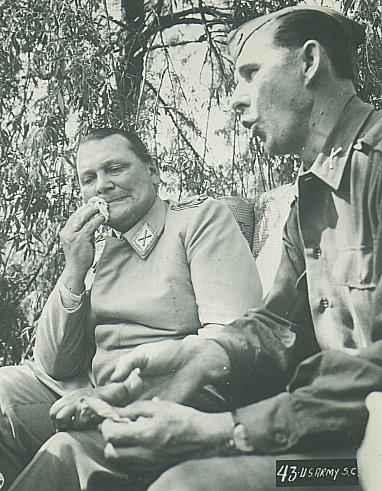
Reichsmarschall
Hermann Goering surrenders to the Allies. Note: Goering will be sentenced to death at the first Nuremberg Trial.
From The Face Of The Third Reich, by Joachim C Fest: In the final phase of his life he (Goering) suffered from profound illusion. In April 1945 he had been dismissed with ignominy from all his posts, arrested, and bequeathed a curse. But when he heard of Hitler's death, he was, his wife recalled, 'close to despair' and exclaimed, 'He's dead, Emmy. Now I shall never be able to tell him that I was true to him till the end!' In much the same way as Himmler, he hoped to be accepted by the Allies as a partner in negotiations. As General Bodenschatz has testified, soon after his capture by the Americans his main concern was the proclamation which he intended to make to the German people as soon as he had reached a satisfactory agreement with Eisenhower. His claim to the leadership of the Reich after Hitler's death was indisputable in his view.
Even at Nuremberg he compelled his fellow prisoner the Grand Admiral Doenitz to admit that he owed his own 'nomination as the Führer's successor solely to coincidence'. And if Goering defended himself before the International Court of Justice with striking skill and some aggressiveness, behind which some of the old elemental force of his personality could be felt, it was because of his conviction that his role as leader placed greater responsibility upon him than upon the other prisoners. Obstinately and at times not without success, he tried to command them, to influence their statements, and to establish a regime which Speer referred to angrily as 'Goering's dictatorship'. At last, after so many years, so many blows and humiliations, for a brief and fruitless span he had reached his goal: to be the First Man and 'Nazi Number One', as he called himself.
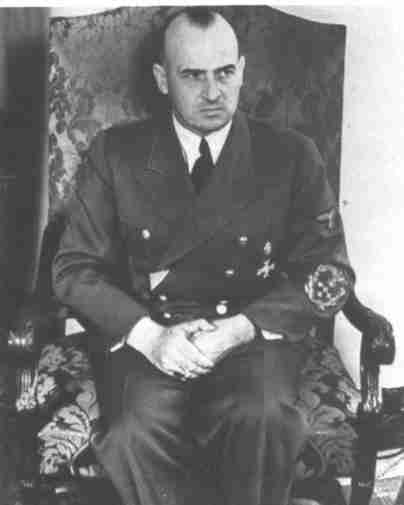
is captured by American troops at Tegernsee near Berchtesgaden. Upon his capture, and after a severe beating from two American soldiers, he tries to cut his own throat. Two days later, he will lacerate his left arm in a second unsuccessful suicide attempt. Note: Only Streicher, of all the other defendants, will be similarly mistreated in captivity. (Maser)
May 4, 1945: Fedor von Bock, General Field Marshal with monarchist sympathies who had been permanently retired by Hitler, is killed in an Allied bombing raid.
May 4, 1945: Field Marshal Montgomery announces that all enemy forces in the Netherlands, Northwest Germany and Denmark have surrendered unconditionally.
May 5, 1945: In Austria, French politicians Reynaud and Daladier and former Austrian Chancellor Schuschnigg, imprisoned by the Nazis, are released. The poet Ezra Pound is arrested in Italy for treason. The Soviets take Swinemuende and Peenemuende on the Baltic coast, where V1 and V2 rockets were launched, to find that all the leading German rocket scientists have evacuated with the Americans. (Menaul)
May 5, 1945: Himmler assembles his SS chieftains to deliver a farewell address, hinting that he still has some great destiny ahead of him. After passing out cyanide capsules all around, Himmler shaves off his mustache, puts on an eyepatch and a Field Security Police uniform, arms himself with a fake ID, and tries to slip away in the confusion. He will eventually commit suicide by cyanide capsule after he is apprehended on May 23.
May 5, 1945 Stalin to Churchill
:
...we cannot be satisfied that persons should be associated with the formation of the future Polish Government who, as you express it, are not fundamentally anti-Soviet, or that only those persons should be excluded from participation in this work who are in your opinion extremely unfriendly towards Russia. Neither of these criteria can satisfy us. We insist, and shall insist, that there should be brought into consultation on the formation of the future Polish Government only those persons who have actively shown a friendly attitude towards the Soviet Union and who are honestly and sincerely prepared to cooperate with the Soviet State. It appears from your message that you are not prepared to regard the Polish Provisional Government as the foundation of the future Government of National Unity, and that you are not prepared to accord it its rightful position in that Government. I must say frankly that such an attitude excludes the possibility of an agreed solution of the Polish question. (Churchill)
May 5, 1945 Truman to Stalin
:
Since you are well acquainted with the position of the US Government from the messages you have received from President Roosevelt and myself, I need hardly tell you that I agree with the views set forth in Mr. Churchill's message of April 28 in regard to the reorganization of the Polish Government. I must tell you that any suggestion that the representatives of the present Polish Provisional Government be invited to San Francisco, conditionally or otherwise, is wholly unacceptable to the Government of the United States. For the United States to agree to such an invitation would mean to accept the present Warsaw Provisional Government as representative of Poland. This would be the equivalent to abandoning the agreement reached in the Crimea. (Churchill)
May 5, 1945 Churchill to Eden (San Francisco)
:
In the north Eisenhower threw in an American corps with great dexterity to help Montgomery in his advance on Luebeck. He got there with twelve hours to spare. There were reports from the British Naval Attache at Stockholm, which we are testing, that, according to Swedish information, the Russians have dropped parachutists a few miles south of Copenhagen and that Communist activities have appeared there. It now appears there were only two parachutists. We are sending in a moderate holding force to Copenhagen by air, and the rest of Denmark is rapidly being occupied from henceforth by our fast-moving armored columns. I think therefore, having regard to the joyful feeling of the Danes and the abject submission and would-be partisanship of the surrendered Huns, we shall head our Soviet friend off at this point too. You will by now have heard the news of the tremendous surrender that has been made to Montgomery of all Northwest Germany, Holland, and Denmark, both as regards men and ships. The men alone must be more than a million. Thus in three successive days 2,5000,000 Germans have surrendered to our British commanders. This is quite a satisfactory incident in our military history. Ike has been splendid throughout. We must vie with him for sportsmanship. (Churchill)
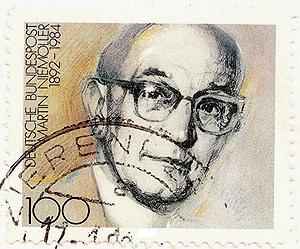
Prominent German anti-Nazi theologian and Lutheran pastor Martin Niemoeller is liberated by the Allies from Nazi captivity.
From Doenitz's IMT testimony: I had no connections with anybody who had been sent to a concentration camp; with the exception of Pastor Niemoeller. Pastor Niemoeller was a former comrade of mine from the Navy. When my last son was killed, he expressed his sympathy; and on that occasion I asked him how he was... I received the answer that he was all right... I received this information through a third person.
May 5, 1945: Admiral Karl Doenitz orders all U-boats to cease offensive operations and return to their bases. German Army Group G surrenders to the Americans at Haar in Bavaria. Mauthausen concentration camp, together with satellite camps at Gunskirchen and Ebensee, become the last concentration camps to be liberated by the Allies. The US War Department announces that 400,000 men will remain in Germany as an occupation force.

From Khrushchev Remembers, by Nikita Khrushchev: I remember one day in Kiev getting a call from Zhukov. He was jubilant. 'Soon I'll have that slimy beast Hitler locked up in a cage,' he said. 'And when I send him to Moscow, I'll ship him by way of Kiev so you can have a look at him.' I wished Zhukov every success. I knew that with him commanding the front, our offensive was in good hands. Then, after Germany capitulated, Zhukov called me again and said, 'I won't be able to keep my promise after all. That snake Hitler is dead. He shot himself, and they burned his corpse. We found his charred carcass.' Thus ended the great epic of our people's war against the Hitlerite invaders. We were overjoyed at the destruction of our enemy, and we felt a lofty moral satisfaction with our victory. The words of Alexander Nevsky rang in our ears: 'He who comes to us with a sword shall perish by the sword.'
I should have known better, but I decided to call Stalin in order to congratulate him on the capitulation of Germany. When he answered the phone, I said, 'Comrade Stalin, permit me to congratulate you on the victory of our armed forces and our people over the German army.' And what was his response? He cut me off rudely and said I was wasting his time. I was simply dumbfounded. I rebuked myself for having called him in the first place. I knew what sort of person he was, and I should have expected exactly what happened. As I have already said, Stalin was a good actor. He was pretending now that since the war was over and done with, he was already thinking about other, more important matters; why should I waste his time talking about yesterday when he was straining his mind, thinking about tomorrow? He acted as though he weren't in the least surprised by our victory. He wanted me to think that he had known all along how the war would turn out. But I knew better. I had watched him during moments of crisis. I knew that during the war he had been even more worried and afraid than the people around him.
May 6, 1945: An Allied CIC team working with the US 80th Division's 319th Regiment arrest
Ernst Kaltenbrunner's wife on an estate in the Austrian town of Strobl. Under interrogation, she informs them that her husband had been with her as recently as May 3. Note: Kaltenbrunner will be captured on May 12 and ultimately be sentenced to death for War Crimes at Nuremberg.
May 6, 1945: Constantin von Neurath is arrested in the French occupation zone; the only Nuremberg defendant captured by the French. Note: The Americans now have ten defendants in custody, the British five, while three are in joint US/UK custody and the Soviets hold two.)
From Bodyguard of Lies, by Anthony Cave Brown: When the war finally ended, the fate of the German General Staff, once so mighty, resembled the collective fate of the Emperors of Byzantium. During his twelve years as Fuehrer, Hitler created twenty-six Field Marshals and Grand Admirals. Few escaped his own fury, and those who did survive did not escape the retribution of the Grand Alliance. All either were shot, committed suicide, were compelled to commit suicide, or were jailed by the Allies. The Chiefs of the General Staff fared no better. All suffered similar ends. Of the estimated 2,500 generals of the Wehrmacht, 786 are known to have died in the war. Of these, 253 were killed in action, 44 died of wounds, 61 committed suicide, 23 were executed by Hitler, 41 were executed by the Allies for war crimes, and 326 died of other or unknown causes. Those captured by the Americans or the British were imprisoned; of those captured by the Russians, many died in jail.
The toll among the SS generals was even greater. Thirty-two were killed in action; four died of their wounds; two were executed by Hitler for treason; fourteen were executed by the Allies for war crimes; five died from unrecorded causes; nine died from natural causes while on duty; eight died in jail; four were executed by the West German government; and sixteen committed suicide. Thus ninety-four of the generals of the inner cabal of Nazism died, from all causes, but most significant was the number of suicides—the ultimate signal of fear and despair—both in the Army and the SS. Ninety-seven German generals died by their own hands. In the Kaiser's war, Germany lost 63 generals in combat and 103 through other causes; only 3 committed suicide.

signs the instruments of unconditional surrender in Reims as representative for
Karl Doenitz. Jodl receives permission to make a statement:
With this signature the German people and the German Armed Forces are, for better or worse, delivered into the hands of the victors...In this hour I can only express the hope that the victor will treat them with generosity.
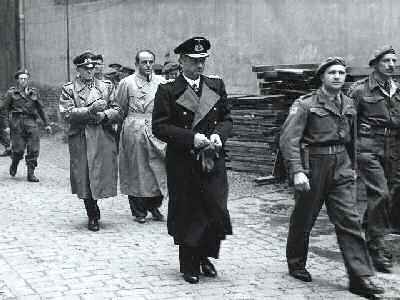
From Keitel's IMT testimony: I can say that I was a soldier by inclination and conviction. For more than 44 years without interruption I served my country and my people as a soldier, and I tried to do my best in the service of my profession. I believed that I should do this as a matter of duty, laboring unceasingly and giving myself completely to those tasks which fell to me in my many and diverse positions. I did this with the same devotion under the Kaiser, under President Ebert, under Field Marshal Von Hindenburg, and under the Führer, Adolf Hitler...
As a German officer, I naturally consider it my duty to answer for what I have done, even if it should have been wrong. I am grateful that I am being given the opportunity to give an account here and before the German people of what I was and my participation in the events which have taken place. It will not always be possible to separate clearly guilt and entanglement in the threads of destiny. But I do consider one thing impossible, that the men in the front lines and the leaders and the subleaders at the front should be charged with the guilt, while the highest leaders reject responsibility. That, in my opinion, is wrong, and I consider it unworthy. I am convinced that the large mass of our brave soldiers were really decent, and that wherever they overstepped the bounds of acceptable behavior, our soldiers acted in good faith, believing in military necessity, and the orders which they received.

The Allies formally accept the unconditional surrender of Nazi Germany as Keitel signs an unconditional surrender in Berlin.
May 8, 1945 VE Day
: Churchill announces the end of the war in Europe:

The Germans are still in places resisting the Russian troops, but should they continue to do so after midnight they will, of course, deprive themselves of the protection of the laws of war, and will be attacked from all quarters by the Allied troops. It is not surprising that on such long fronts and in the existing disorder of the enemy the orders of the German High Command should not in every case be obeyed immediately. This does not, in our opinion, with the best military advice at our disposal, constitute any reason for withholding from the nation the facts communicated to us by General Eisenhower of the unconditional surrender already signed at Rheims, nor should it prevent us from celebrating to-day and to-morrow (Wednesday) as Victory in Europe days. Today, perhaps, we shall think mostly of ourselves. Tomorrow we shall pay a particular tribute to our Russian comrades, whose prowess in the field has been one of the grand contributions to the general victory. The German war is therefore
at an end...
 Twitter: @3rdReichStudies
FB: Horrific 20th Century History
Twitter: @3rdReichStudies
FB: Horrific 20th Century History









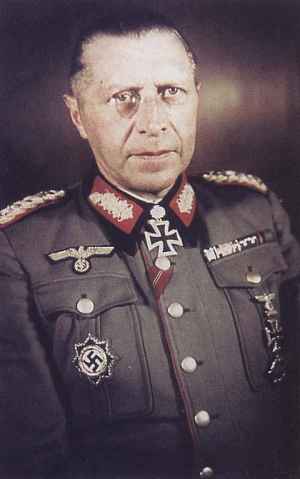

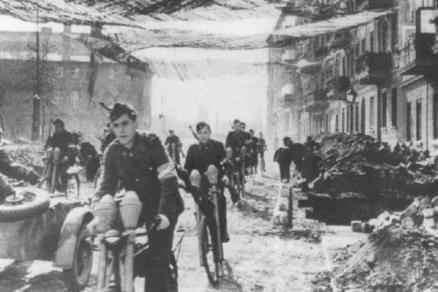
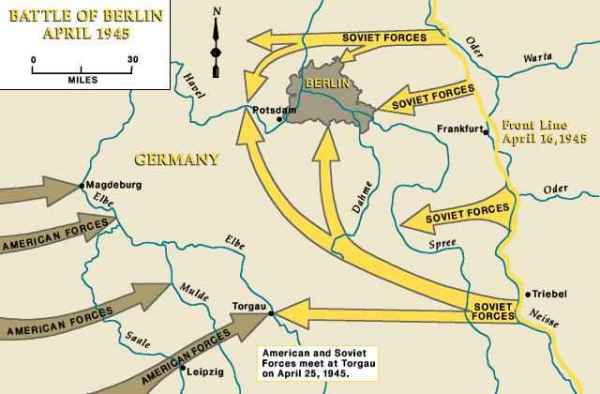



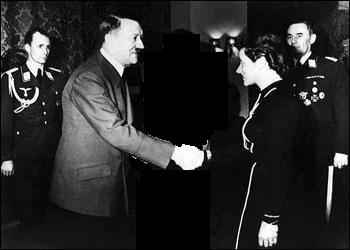
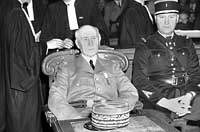
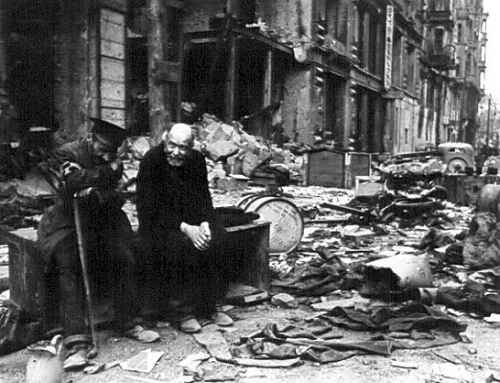

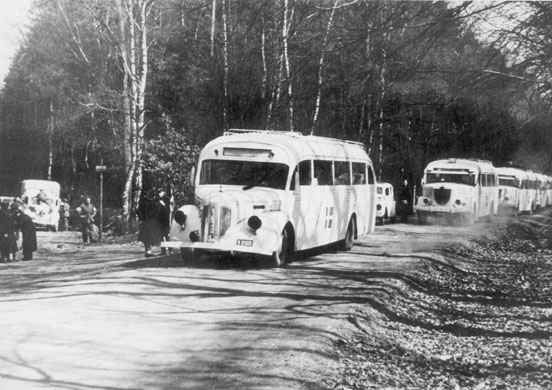




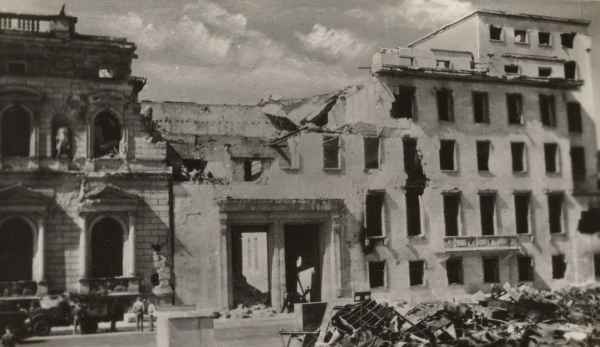
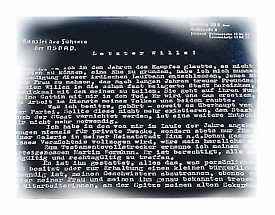
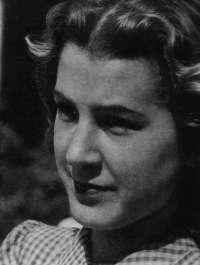



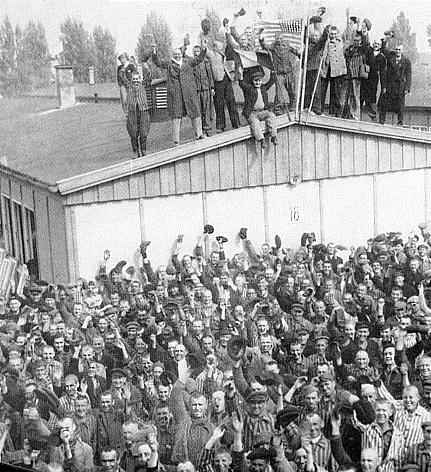


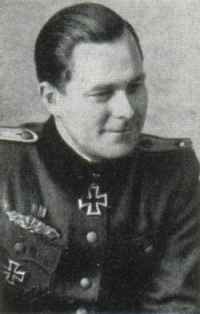
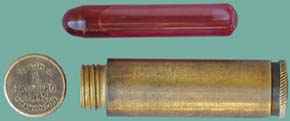





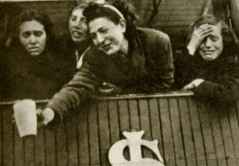

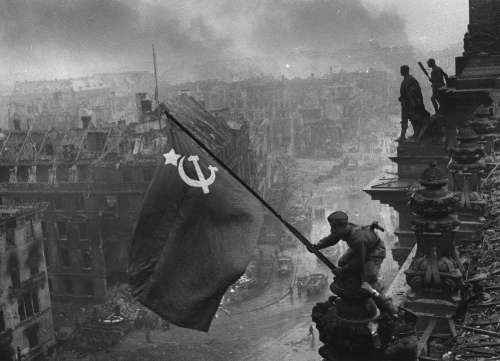





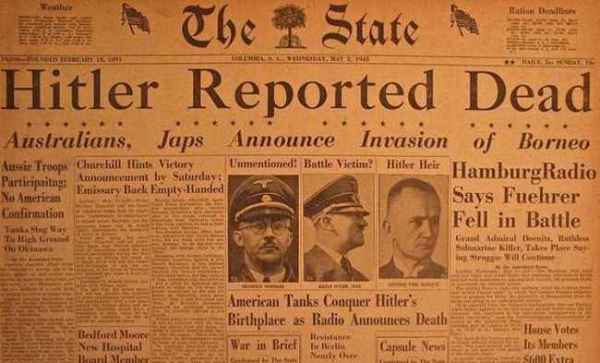

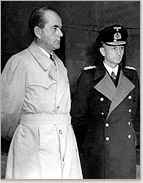

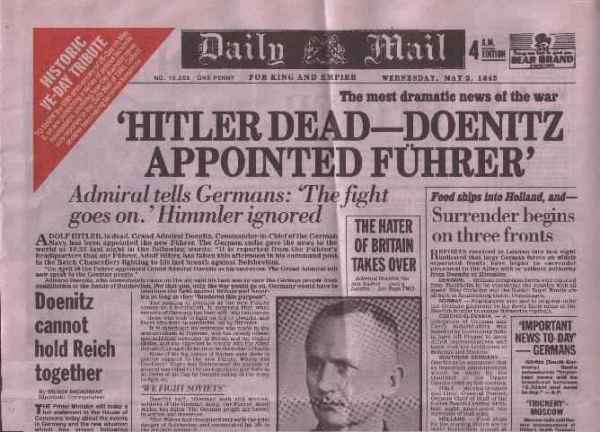


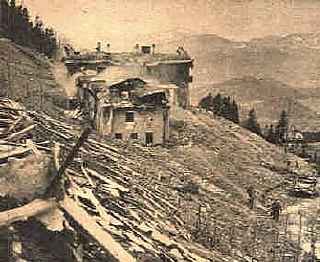

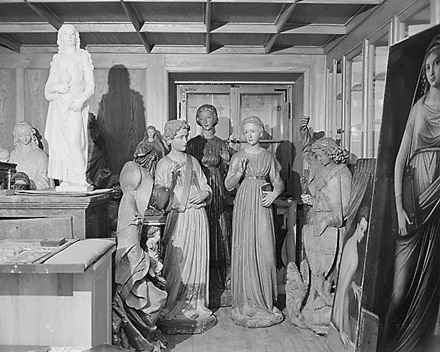
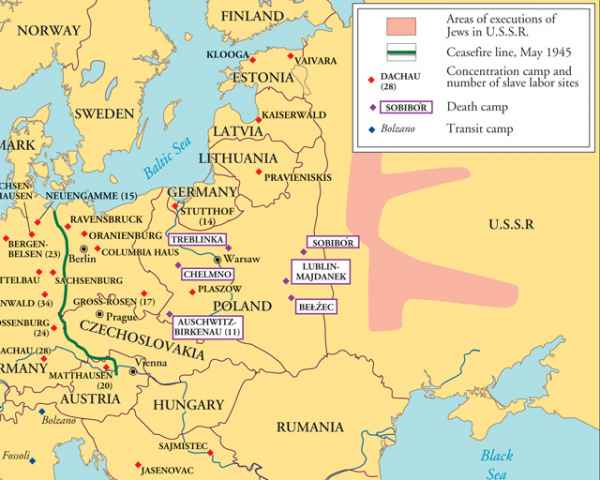


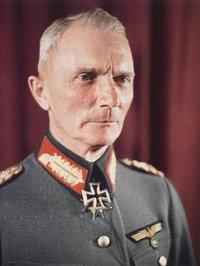
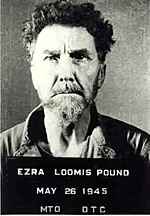



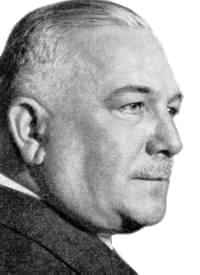



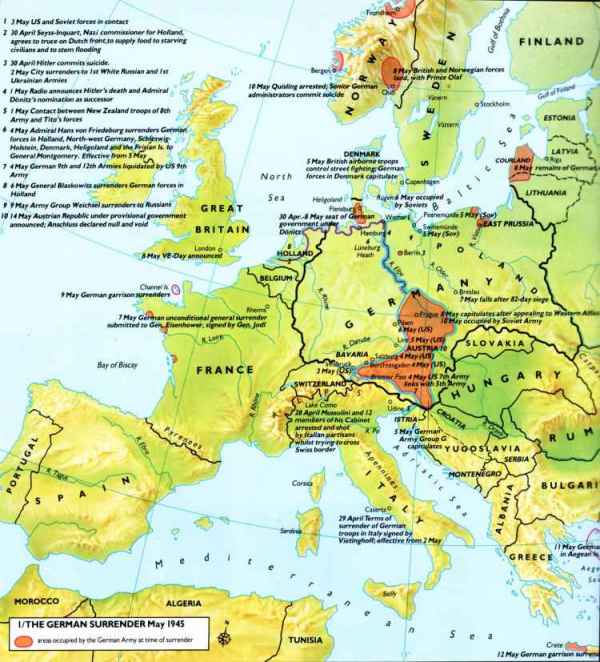

Twitter: @3rdReichStudies FB: Horrific 20th Century History




